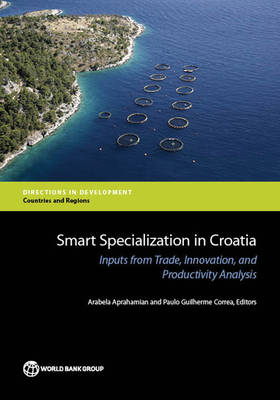
Bedankt voor het vertrouwen het afgelopen jaar! Om jou te bedanken bieden we GRATIS verzending (in België) aan op alles gedurende de hele maand januari.
- Afhalen na 1 uur in een winkel met voorraad
- In januari gratis thuislevering in België
- Ruim aanbod met 7 miljoen producten
Bedankt voor het vertrouwen het afgelopen jaar! Om jou te bedanken bieden we GRATIS verzending (in België) aan op alles gedurende de hele maand januari.
- Afhalen na 1 uur in een winkel met voorraad
- In januari gratis thuislevering in België
- Ruim aanbod met 7 miljoen producten
Zoeken
€ 50,95
+ 101 punten
Omschrijving
Between 2003 and 2008, Croatia's rapid growth was fueled by rising domestic consumption, growing deficits, an increased dependence on international finance. Such growth is unlikely to resume in the near future, imposing social and economic costs. In this context, exports are critically important for Croatia's development and employment generation. However, the country's trade performance has been lackluster since the financial crisis. Export openness is lower than in countries with similar income levels, and the country's per capita GDP has stagnated. Low export diversification, weak competitiveness, and reduced technological sophistication help to explain stagnant exports. The fundamental problem is the failure to renew and transform the manufacturing base, which is linked to low rates of firm entry and exit. Another marker of a sluggish economy is the inadequate level of business research and development expenditure by Croatian enterprises and the weak governance framework for research and innovation, which is impairing the impact of research and development spending. In this context, Smart Specialization in Croatia aims to provide insights to the country's smart specialization strategy (RIS3) by looking at the main constraints and opportunities that it faces in its economic progress along three interrelated dimensions: trade, firm productivity, and research and development. The report also includes four case studies to illustrate potential RIS3 approaches to spur research and innovation specialization at the regional level. The report's ultimate objective is to help develop a strategy that fosters productivity growth, job creation, and a more diversified export structure.
Specificaties
Betrokkenen
- Auteur(s):
- Uitgeverij:
Inhoud
- Aantal bladzijden:
- 172
- Taal:
- Engels
- Reeks:
Eigenschappen
- Productcode (EAN):
- 9781464804588
- Verschijningsdatum:
- 24/06/2015
- Uitvoering:
- Paperback
- Formaat:
- Trade paperback (VS)
- Afmetingen:
- 178 mm x 254 mm
- Gewicht:
- 312 g

Alleen bij Standaard Boekhandel
+ 101 punten op je klantenkaart van Standaard Boekhandel
Beoordelingen
We publiceren alleen reviews die voldoen aan de voorwaarden voor reviews. Bekijk onze voorwaarden voor reviews.









